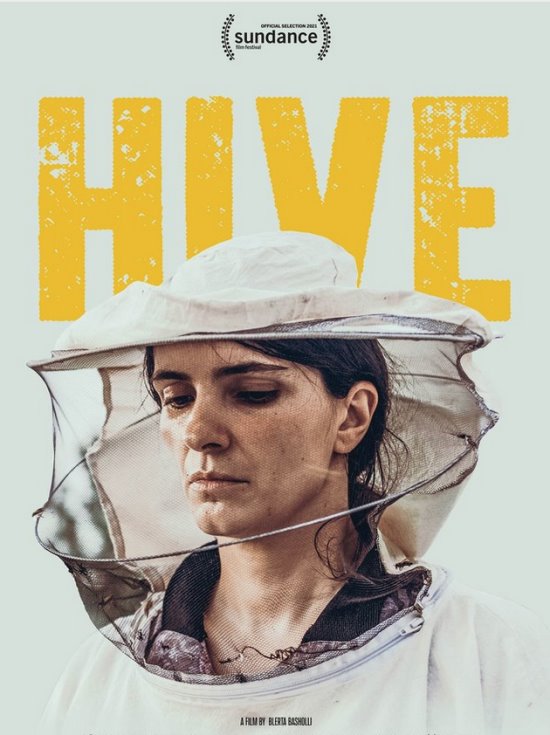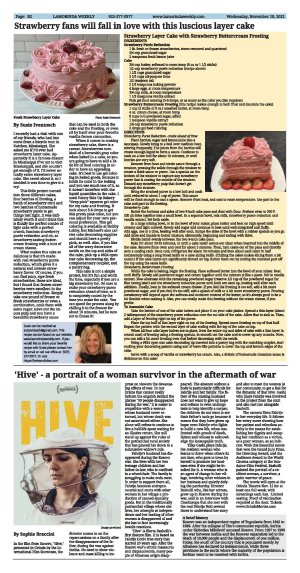| | Published November 10th, 2021
| 'Hive' - a portrait of a woman survivor in the aftermath of war
| | | By Sophie Braccini |  | | Image provided |
In the film from Kosovo, "Hive," presented in Orinda by the International Film Showcase, the director zooms in on the repercussions on a family after the disappearance of the father, during the war against Serbia. No need to show violence and mass killing to impress on viewers the devastating effects of war. To our brains that cannot really fathom the anguish behind the phrase "50 people disappeared during the war," it is easier to empathize with a woman whose husband never returned, but whose death was not ascertained either. She alone will refuse to continue to live a half-life spent waiting for an illusive return. She will stand up against the rules of the patriarchal rural society that has pinned her down to a submissive widow's role.
 Fahrije's husband has disappeared during the Kosovo war. She lives with her two teenage children and her father-in-law, who is confined to a wheelchair. The family is struggling to make ends meet. In order to support them all, Fahrije becomes entrepreneurial and starts with other women in her village a production of canned specialty goods. But in the traditionally patriarchal village where she lives, her attempts at independence and her leading of other women is disapproved of and she has to face increasingly hostile reactions. Fahrije's husband has disappeared during the Kosovo war. She lives with her two teenage children and her father-in-law, who is confined to a wheelchair. The family is struggling to make ends meet. In order to support them all, Fahrije becomes entrepreneurial and starts with other women in her village a production of canned specialty goods. But in the traditionally patriarchal village where she lives, her attempts at independence and her leading of other women is disapproved of and she has to face increasingly hostile reactions.
 "Hive" is Blerta Basholli's first feature film. It is based on Fahrije Hoti's true story that started 20 years ago. After the Kosovo war's ethnic massacres and displacements, many people of Albanese origin disappeared. The absence without a body is particularly difficult for Fahrije and her family. The father of the missing husband does not want to give up hope and refuses to even undergo tests to help identify a corpse; the children do not want to see their father's tools go because it means that they have given up hope; even Fahrije who fights to build a new life, when confronted with proofs of death, falters and refuses to acknowledge the inescapable truth. "Hive" is Blerta Basholli's first feature film. It is based on Fahrije Hoti's true story that started 20 years ago. After the Kosovo war's ethnic massacres and displacements, many people of Albanese origin disappeared. The absence without a body is particularly difficult for Fahrije and her family. The father of the missing husband does not want to give up hope and refuses to even undergo tests to help identify a corpse; the children do not want to see their father's tools go because it means that they have given up hope; even Fahrije who fights to build a new life, when confronted with proofs of death, falters and refuses to acknowledge the inescapable truth.
 Yllka Gashi plays Fahrije, the resilient woman who learns to drive when others do not dare, who goes to town by herself to promote her business even if she might be insulted for it. A woman who is an agent of change in her village, involving other widows in her business and quietly defying the patriarchy. Director Basholli who, like her actress, grew up in Kosovo during the war, said in an interview with CineEuropa that she met with the real Fahrije Hoti several times to understand her story and also to meet the women in her community, to get a feel for the dynamic of that hive. Gashi who plays Fahrije was involved in the project from the start and also met her alongside Basholli. Yllka Gashi plays Fahrije, the resilient woman who learns to drive when others do not dare, who goes to town by herself to promote her business even if she might be insulted for it. A woman who is an agent of change in her village, involving other widows in her business and quietly defying the patriarchy. Director Basholli who, like her actress, grew up in Kosovo during the war, said in an interview with CineEuropa that she met with the real Fahrije Hoti several times to understand her story and also to meet the women in her community, to get a feel for the dynamic of that hive. Gashi who plays Fahrije was involved in the project from the start and also met her alongside Basholli.
 The camera films Fahrije in her everyday life. It follows her every move showing how her patient and relentless activity is the means for establishing her dignity and escaping her condition as a victim, as a poor woman, as an inferior.?With this beautiful movie that won the Grand Jury Prize, the Directing Award, and the Audience Award in the World Cinema category at the Sundance Film Festival, Basholli painted the portrait of a resilient woman, a survivor, a quiet warrior of peace. The camera films Fahrije in her everyday life. It follows her every move showing how her patient and relentless activity is the means for establishing her dignity and escaping her condition as a victim, as a poor woman, as an inferior.?With this beautiful movie that won the Grand Jury Prize, the Directing Award, and the Audience Award in the World Cinema category at the Sundance Film Festival, Basholli painted the portrait of a resilient woman, a survivor, a quiet warrior of peace.
 The movie will open at the Orinda Theatre Nov. 12 for at least one full week, with screenings each day. Limited seating. Proof of vaccination required at the door. Tickets: www.OrindaMovies.com The movie will open at the Orinda Theatre Nov. 12 for at least one full week, with screenings each day. Limited seating. Proof of vaccination required at the door. Tickets: www.OrindaMovies.com

 A brief history A brief history
 Kosovo was an independent region of Yugoslavia from 1945 to 1989. After the collapse of Tito's communist republic, Serbia under Slobodan Milosevi annexed Kosovo. From 1997 to 1999 the war between Serbia and the Kosovar separatists led to the death of 10,000 people and the displacement of one million. Today, the south of the country that is populated mostly by Albanese has declared its independence, while three provinces in the north where the majority of the population is Serbian want to be reunited with Serbia. Kosovo was an independent region of Yugoslavia from 1945 to 1989. After the collapse of Tito's communist republic, Serbia under Slobodan Milosevi annexed Kosovo. From 1997 to 1999 the war between Serbia and the Kosovar separatists led to the death of 10,000 people and the displacement of one million. Today, the south of the country that is populated mostly by Albanese has declared its independence, while three provinces in the north where the majority of the population is Serbian want to be reunited with Serbia. |
| | | | | | | | | | | | |



